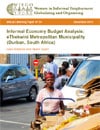Informal Economy Budget Analysis: eThekwini Metropolitan Municipality
WIEGO’s Informal Economy Budget Analysis (IEBA) examines how government budgets address the needs and interests of different groups of informal workers. It also explores what opportunities exist for informal workers (or their representatives) to participate at different stages of the budget process.
The eThekwini Municipality has estimated that approximately one in four employed persons in the metropolitan region are working informally. This report examines the nature and associated trends of allocation and expenditure in the eThekwini Municipal Budget for activities that have a direct and indirect impact on those working informally.
The report includes an overview of the informal economy in Durban, followed by a discussion of some of the features of the budget process, including an overview of the city-wide eThekwini Municipality budget in recent years. The report then moves on to the core discussion of budgeting for the informal economy in the eThekwini Municipality. This is followed with analysis of selected budget issues relevant to the informal economy, based on an examination of budget documentation and interviews with city officials.
The report concludes by identifying key issues that could form part of future dialogue efforts around budgeting for the informal economy in Durban.
Visit our section on Informal Economy Budget Analysis.
View list of all: WIEGO Publication Series

